1+1=3. The trinamic formula represented by Michelangelo Pistoletto’s Third Paradise directs the spotlight on the importance of the encounter between two units which, when placed together, can give rise to something new thanks to their interaction. Thus the reinterpretation of the sign-symbol of infinity creates astonishment, through an art that deconstructs – or rather, reinvents – a mathematical calculation that was at the basis of our education in primary school. Metaphorical, but not too much. In short, interaction, exchange and dialogue can not only generate something new, but also shape nuances of individuality itself. Also some of Cittadellarte‘s residencies, the UNIDEE labs, have given and will give prominence to the creative importance of listening and sharing in order to address the key issues that are the object of study and development by the residents. The reference is to the one-week-long modules Tools and Technologies for Embedded Arts Practice, held in November, and the labs Artwork as Toolkit and Tools for the Commons, due in March. As specified by visiting curator Andy Abbott, a common thread links the two residencies: the pandemic and socially engaged art in the post COVID 19 era. “In 2020 and 2021, the ‘embedded practice’ residencies brought together a broad range of practitioners from all over the world to share and develop their situated practices and action-research,”commented Abbot, “in a time of changeable travel restrictions and social distancing measures, we found that residents valued the opportunity to share experiences of making socially-engaged work that is inextricably linked to its context and often relied on intimate connections and engagement with audiences, participants and collaborators”. Through group critiques, the creation of individual and collective tracks and final sessions, participants found and will find ways to share complex and sometimes large-scale or long-term projects. “Despite the specificity of the practices shared,” said the visiting curator, “we found there was benefit in temporarily taking them out of context and inviting fresh perspective to identify common themes, methodologies, approaches, and challenges. In our various (post-)pandemic contexts we also began to share experiences of (mis)using and applying ‘old’ technologies and emerging digital tools; from letters and postcards, to creative ‘hacking’ of conference call breakout rooms and screen sharing, to propositions for blockchain and cryptocurrencies to create fairer working conditions. The labs are an opportunity to continue this process together in presence”.
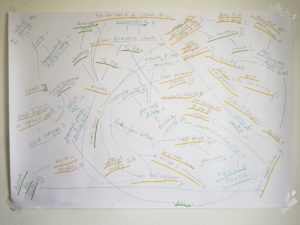
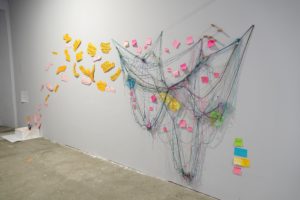
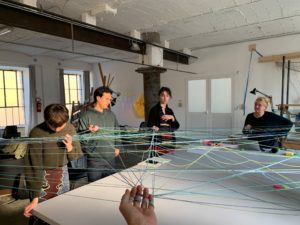
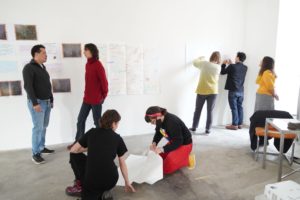
Photo credits: Roberto Nino Betancourt.
The first lab
The residencies Embedded Arts Practice in a Postpandemic Future (2020) and Groundwork for Embedded Arts Practice (2021) were an opportunity to share, unpack and apply the residents’ ongoing artistic practices or action-research with other international figures, including UNIDEE’s residency programme team, and guests like artist Jeanne van Heeswijk (Netherlands); curator, writer, artist and educator Paul O’ Neill (PUBLICS, Helsinki); artist, educator and researcher Mick Wilson (HDK-Valand, Gothenburg); artist and curator Yvonne Carmichael (South Square Centre, Bradford). Over the course of seven days, group critiques, facilitated workshops, collective trace-making and informal activities created an ad-hoc space in which participants acquired new tools and methodologies to apply to their own research projects by experimenting with them in a new geographical and social setting. The residents, coming from a wide range of backgrounds and with diverse practices in the field of socially engaged art and social, curatorial and community interests, were: Josie Tothill (UK); Diego Gutierrez (CR/PL); Ligia Fernandes (PT); Roberto Nino Betancourt (CO/IT); Jojo Hynes (IE); Stephanie Hanna (USA / DE); Claire Bouffay (FR); Tizo All (BR/DE); Ginevra Ludovici and Giovanni Paolin (IT); Lexie Owen (CA/NO); Alice Pedroletti (IT/DE); Annabelle Craven-Jones (UK); Krisztian Torok (HU); Olena Iegorova (UA/CH). The programme was divided into two consecutive workshops at Cittadellarte, with a seminar and a handover session to link the two. The first was held from 4 to 15 November with Jeanne Van Heeswijk as mentor, while the second took place from 12 to 20 November with contributions from Mick Wilson, Paul O’Neill and Yvonne Carmichael. The workshops, held in the spaces of Fondazione Pistoletto, served as a shared studio for group discussions, sharing sessions and presentations, with the opportunity for immersive exploration of the context of Biella’s post-industrial and rural landscapes. As mentioned, the training methodology was articulated through group critiques, the sharing of the participants’ practices, group exercises, workshops and less formal activities. At the end of the workshop, a seminar/symposium presented the work of the residents, the curatorial team, the guests and the mentors; on that occasion, the residents of the two weeks also had the opportunity to meet, take part in group discussions and handover their experience, which generated new creative inputs.
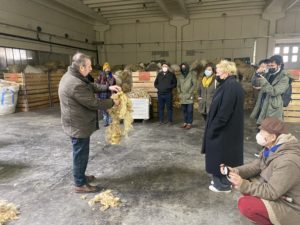
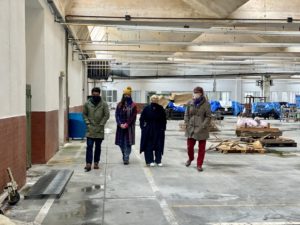
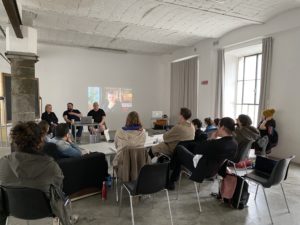
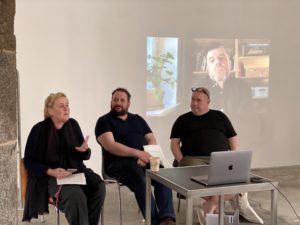
The second workshop
The second lab, which will start in March, will have many points in common with the first one as far as the creative and relational dimensions are concerned. Specifically, the programme will offer two separate residencies: Artwork as Toolkit (from 21 to 26 March) and Tools for the Commons (from 28 March to 2 April). The lab Artwork as Toolkit will kick off with a key question, i.e. ‘What are our tools?’: this residency in fact stems from the intersection of two online platforms – www.arte-util.org and www.dpe.tools –, which will be presented by Alessandra Saviotti in collaboration with Gemma Medina and Owen Griffiths. “Starting with the recent ‘usological turn’,” explained the mentors, “we will examine a set of tools and exercises developed within both platforms – the ‘Art Coefficient’ and ‘A Capitalist Reading of Our Usual Breakfast’ –, which place art at the beginning of the development of a series of tactics to achieve social change”. Analysing the idea of an artwork as a toolkit, the mentors will invite the residents to examine how socially engaged art can be intended “as an expanded technology that manifests as 1:1 scale practices”. The question raised by the mentors that will be put to the residents is “From our diverse and often specific practices and projects, what surplus can we share, preserve, ferment and carry forward for the future?”
In the workshop Tools for the Commons, the experiences of artists and activists will be brought together and networked, creating spaces “for the growth of the commons; from the micro level of the individual, personal or subjective, to the reclamation or occupation of urban space, to the influence of planning and politics”. Mentors Emanuele Braga and Gabriella Riccio will draw on their experiences in the occupied art and culture spaces MACAO (Milan) and L’Asilo (Naples), as well as the post-capitalist think-tank of the Institute of Radical Imagination; long-time collaborators Keir Milburn and Gareth Brown will also share a British perspective on creative activism, including the use of political strategy games, utopian awareness sessions and the establishment of joint public partnerships. One of the key input that will be offered during the week is “What tools (or toys) for establishing and developing the commons can we identify, adapt or invent? Which of these are we able and willing to share, and on what terms?”. Here is the list of the participants: Artwork as Toolkit will be attended by Kristyn Lopez (USA), RL Wilson (GB), Calum Bayne (GB), Caterina Stamou (GR), Hwa Young (GB), Cristina Picco (IT), Lexie Owen (CA), Annelyse Gelman (USA), Kasia Sobucka (PL); and Tools for the Commons by Nicole Sánchez (PT), Rachel Botha (IE), Nicolas Ferrara (IT), Anouk Beckers (NL), Calcagno Cullen (USA), Hwa Young (UK), Cristina Picco (IT), Lexie Owen (CA).
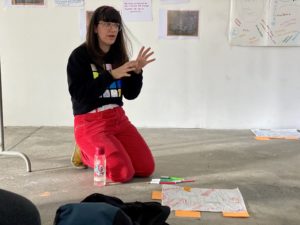
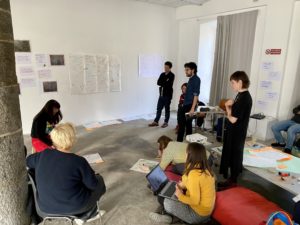
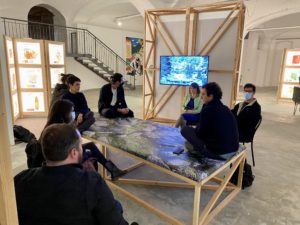
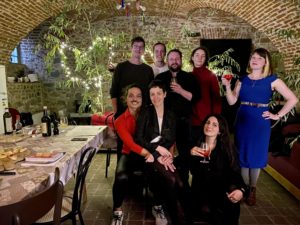
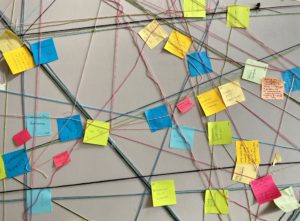
The comment of the visiting curator
“As socially engaged art is increasingly recognised by the mainstream and institutional art world as a discipline,” Abbotte xplained, “we reflect on how to create shared resources and toolkits for integrated practices that can disrupt the homogenisation and standardisation of such practice. How can we deterritorialise a site-specific practice and keep it sharp? What can be shared, what can be transferred, what can be adapted and repurposed, what is context-dependent? What tools and instruments can be readdressed or repurposed to do more than, in Audre Lorde’s words, temporarily beat the master at his own game? What resources and tactics can we share to collectively dismantle the old world and forge new paths out of the perennial crises of late capitalism? And in addition to instrumentalisation,” he concluded, “what other benefits could there be in taking the time to share our concrete experiences and learn from each other?”.

